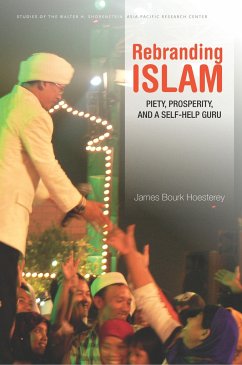- Gebundenes Buch
- Merkliste
- Auf die Merkliste
- Bewerten Bewerten
- Teilen
- Produkt teilen
- Produkterinnerung
- Produkterinnerung
James B. Hoesterey is Assistant Professor of Religion at Emory University.
Andere Kunden interessierten sich auch für
![Dreams of a Refugee Dreams of a Refugee]() Mostafa SalamehDreams of a Refugee8,99 €
Mostafa SalamehDreams of a Refugee8,99 €![Muhammad Muhammad]() Deepak ChopraMuhammad18,99 €
Deepak ChopraMuhammad18,99 €![Black Autonomy Black Autonomy]() Jennifer GoettBlack Autonomy126,99 €
Jennifer GoettBlack Autonomy126,99 €![Not Without My Daughter Not Without My Daughter]() Betty MahmoodyNot Without My Daughter8,99 €
Betty MahmoodyNot Without My Daughter8,99 €![Boy Erased Boy Erased]() Garrard ConleyBoy Erased10,99 €
Garrard ConleyBoy Erased10,99 €![The Art of the Wasted Day The Art of the Wasted Day]() Patricia HamplThe Art of the Wasted Day15,99 €
Patricia HamplThe Art of the Wasted Day15,99 €![Dancing in the Mosque Dancing in the Mosque]() Homeira QaderiDancing in the Mosque23,99 €
Homeira QaderiDancing in the Mosque23,99 €-
-
-
James B. Hoesterey is Assistant Professor of Religion at Emory University.
Hinweis: Dieser Artikel kann nur an eine deutsche Lieferadresse ausgeliefert werden.
Hinweis: Dieser Artikel kann nur an eine deutsche Lieferadresse ausgeliefert werden.
Produktdetails
- Produktdetails
- Verlag: Stanford University Press
- Seitenzahl: 296
- Erscheinungstermin: 11. November 2015
- Englisch
- Abmessung: 231mm x 155mm x 23mm
- Gewicht: 522g
- ISBN-13: 9780804795111
- ISBN-10: 0804795118
- Artikelnr.: 42803174
- Herstellerkennzeichnung
- Libri GmbH
- Europaallee 1
- 36244 Bad Hersfeld
- gpsr@libri.de
- Verlag: Stanford University Press
- Seitenzahl: 296
- Erscheinungstermin: 11. November 2015
- Englisch
- Abmessung: 231mm x 155mm x 23mm
- Gewicht: 522g
- ISBN-13: 9780804795111
- ISBN-10: 0804795118
- Artikelnr.: 42803174
- Herstellerkennzeichnung
- Libri GmbH
- Europaallee 1
- 36244 Bad Hersfeld
- gpsr@libri.de
James B. Hoesterey is Assistant Professor of Religion at Emory University.
Contents and Abstracts
Introduction: Authority, Subjectivity, and the Cultural Politics of Public
Piety
chapter abstract
The Introduction frames the book in terms of the anthropology of psychology
and it within theoretical conversations concerning religious authority,
Muslim subjectivity, and the cultural politics of public piety. It argues
that Aa Gym garnered religious authority through adept use of media and the
deliberate cultivation of his personal brand in the religious marketplace
of modernity. His authority was marked by distinctive affective and
economic relationships between preacher-producer and consuming devotees. It
also argues that Islamic self-help psychology promotes models of personhood
that are commensurate with, but cannot be reduced to, neoliberal logics of
self-enterprise and democratic notions of civic virtue. Aa Gym also
leveraged his public pulpit into political voice in an attempt to
discipline state actors during the drafting of controversial
anti-pornography legislation. The Introduction argues that scholarly
understandings of political Islam must focus on popular culture, not simply
electoral politics and formal institutions.
1Branding Islam: Autobiography, Authenticity, and Religious Authority
chapter abstract
Known across the Indonesian archipelago as a shrewd entrepreneur, doting
husband, and virtuous family man, Gymnastiar legitimated his claim to
religious authority through his ability to market himself as the embodiment
of Islamic virtue. This chapter///////
2Enchanting Science: Popular Psychology as Religious Wisdom
chapter abstract
3Ethical Entrepreneurs: Islamic Ethics and the Spirit of Capitalism
chapter abstract
4Prophetic Cosmopolitanism: The Prophet Muhammad as Psycho-Civic exemplar
chapter abstract
5Shaming the State: Pornography and the Moral Psychology of Statecraft
chapter abstract
6Sincerity and Scandal: The Moral and Market Logics of Religious Authority
chapter abstract
Conclusion: Figuring Islam: Popular Culture and the Cutting Edge of Public
Piety
chapter abstract
Introduction: Authority, Subjectivity, and the Cultural Politics of Public
Piety
chapter abstract
The Introduction frames the book in terms of the anthropology of psychology
and it within theoretical conversations concerning religious authority,
Muslim subjectivity, and the cultural politics of public piety. It argues
that Aa Gym garnered religious authority through adept use of media and the
deliberate cultivation of his personal brand in the religious marketplace
of modernity. His authority was marked by distinctive affective and
economic relationships between preacher-producer and consuming devotees. It
also argues that Islamic self-help psychology promotes models of personhood
that are commensurate with, but cannot be reduced to, neoliberal logics of
self-enterprise and democratic notions of civic virtue. Aa Gym also
leveraged his public pulpit into political voice in an attempt to
discipline state actors during the drafting of controversial
anti-pornography legislation. The Introduction argues that scholarly
understandings of political Islam must focus on popular culture, not simply
electoral politics and formal institutions.
1Branding Islam: Autobiography, Authenticity, and Religious Authority
chapter abstract
Known across the Indonesian archipelago as a shrewd entrepreneur, doting
husband, and virtuous family man, Gymnastiar legitimated his claim to
religious authority through his ability to market himself as the embodiment
of Islamic virtue. This chapter///////
2Enchanting Science: Popular Psychology as Religious Wisdom
chapter abstract
3Ethical Entrepreneurs: Islamic Ethics and the Spirit of Capitalism
chapter abstract
4Prophetic Cosmopolitanism: The Prophet Muhammad as Psycho-Civic exemplar
chapter abstract
5Shaming the State: Pornography and the Moral Psychology of Statecraft
chapter abstract
6Sincerity and Scandal: The Moral and Market Logics of Religious Authority
chapter abstract
Conclusion: Figuring Islam: Popular Culture and the Cutting Edge of Public
Piety
chapter abstract
Contents and Abstracts
Introduction: Authority, Subjectivity, and the Cultural Politics of Public
Piety
chapter abstract
The Introduction frames the book in terms of the anthropology of psychology
and it within theoretical conversations concerning religious authority,
Muslim subjectivity, and the cultural politics of public piety. It argues
that Aa Gym garnered religious authority through adept use of media and the
deliberate cultivation of his personal brand in the religious marketplace
of modernity. His authority was marked by distinctive affective and
economic relationships between preacher-producer and consuming devotees. It
also argues that Islamic self-help psychology promotes models of personhood
that are commensurate with, but cannot be reduced to, neoliberal logics of
self-enterprise and democratic notions of civic virtue. Aa Gym also
leveraged his public pulpit into political voice in an attempt to
discipline state actors during the drafting of controversial
anti-pornography legislation. The Introduction argues that scholarly
understandings of political Islam must focus on popular culture, not simply
electoral politics and formal institutions.
1Branding Islam: Autobiography, Authenticity, and Religious Authority
chapter abstract
Known across the Indonesian archipelago as a shrewd entrepreneur, doting
husband, and virtuous family man, Gymnastiar legitimated his claim to
religious authority through his ability to market himself as the embodiment
of Islamic virtue. This chapter///////
2Enchanting Science: Popular Psychology as Religious Wisdom
chapter abstract
3Ethical Entrepreneurs: Islamic Ethics and the Spirit of Capitalism
chapter abstract
4Prophetic Cosmopolitanism: The Prophet Muhammad as Psycho-Civic exemplar
chapter abstract
5Shaming the State: Pornography and the Moral Psychology of Statecraft
chapter abstract
6Sincerity and Scandal: The Moral and Market Logics of Religious Authority
chapter abstract
Conclusion: Figuring Islam: Popular Culture and the Cutting Edge of Public
Piety
chapter abstract
Introduction: Authority, Subjectivity, and the Cultural Politics of Public
Piety
chapter abstract
The Introduction frames the book in terms of the anthropology of psychology
and it within theoretical conversations concerning religious authority,
Muslim subjectivity, and the cultural politics of public piety. It argues
that Aa Gym garnered religious authority through adept use of media and the
deliberate cultivation of his personal brand in the religious marketplace
of modernity. His authority was marked by distinctive affective and
economic relationships between preacher-producer and consuming devotees. It
also argues that Islamic self-help psychology promotes models of personhood
that are commensurate with, but cannot be reduced to, neoliberal logics of
self-enterprise and democratic notions of civic virtue. Aa Gym also
leveraged his public pulpit into political voice in an attempt to
discipline state actors during the drafting of controversial
anti-pornography legislation. The Introduction argues that scholarly
understandings of political Islam must focus on popular culture, not simply
electoral politics and formal institutions.
1Branding Islam: Autobiography, Authenticity, and Religious Authority
chapter abstract
Known across the Indonesian archipelago as a shrewd entrepreneur, doting
husband, and virtuous family man, Gymnastiar legitimated his claim to
religious authority through his ability to market himself as the embodiment
of Islamic virtue. This chapter///////
2Enchanting Science: Popular Psychology as Religious Wisdom
chapter abstract
3Ethical Entrepreneurs: Islamic Ethics and the Spirit of Capitalism
chapter abstract
4Prophetic Cosmopolitanism: The Prophet Muhammad as Psycho-Civic exemplar
chapter abstract
5Shaming the State: Pornography and the Moral Psychology of Statecraft
chapter abstract
6Sincerity and Scandal: The Moral and Market Logics of Religious Authority
chapter abstract
Conclusion: Figuring Islam: Popular Culture and the Cutting Edge of Public
Piety
chapter abstract








